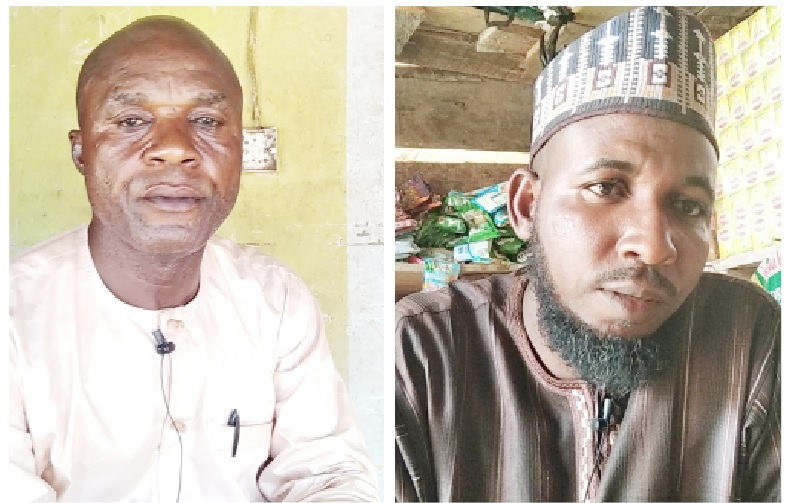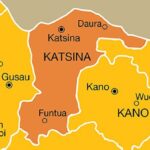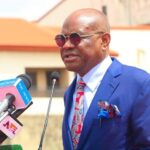The #EndSARS protest in the Federal Capital Territory (FCT) may have ended, but the destruction and loss of lives it left behind are still fresh in the minds of victims. Three months after the crisis, the government is yet to fulfil its promise, Daily Trust learnt.
The #EndSARS protest which started as a peaceful procession was later hijacked by hoodlums and hired thugs who started attacking citizens with dangerous weapons and destroying government-owned and private properties.
- How clashes between Customs, smugglers claim lives in border communities
- 5 Reasons Why the New Universities Will Benefit the North
Anthony Onome was one of the people who died as a result of the wounds he sustained during the attacks.
The Inspector-General of Police, Mohammed Adamu, had announced that 73 persons were killed in 16 days, out of which 22 were policemen.
When Ijeoma Dike, 52, sent her 17-year-old son, Emmanuel Uchechukwu on errand on October 20, 2020, she never knew it would be his last day on earth.
Uchechukwu was asked to take food to his elder brother, a few kilometers from their home at Dutse-Makaranta in Bwari Area Council, Federal Capital Territory (FCT), when a stray bullet hit him. He died as all efforts to resuscitate him failed.
Narrating how his son was killed,` Uchechukwu’s father, Dike said, “He was on his way back when a stray bullet hit him.”
I got to know that police officers from Mopol 50 earlier brought two Hilux vans to disperse protesters in the community, but instead of using non-lethal weapons, live rounds were used. They shot directly at the protesters, and unfortunately, my son was hit.”
Uchechukwu, who got admission into the Nasarawa State University to read Theatre and Performing Art, died on the spot.
Mr Dike believes it was his son’s death that led to the attack on the police station at Dutse-Makaranta and a customary court in the area.
On the same day at Apo Pigba, Attahiru Muhammed got information that the mosque he used for Quran lessons was set ablaze by hoodlums as they burnt shops and cars in that vicinity. Armed with a dagger, he moved to save the mosque from destruction, but he did not get to his destination as he was hacked to death on the way.
Recounting Muhammed’s ordeal, his wife, Adama, said, “When he was going I warned him that he would not be able to do anything if he met the hoodlums, but my warning and plea fell on deaf ears.
“I saw them taking his corpse to be buried and followed them. They told me to go back, but at 62, I know what death is.”
Three months after the incident, Adama said the family had been living on the goodwill of families and friends.
Muhammed left three wives and 13 children, including a son his last wife gave birth to (whom he did not see).
She appealed to the government to come to their aid.
Tosin Oladimeji, 29, was also shot during the fracas between the police and protesters at Dutse. He was, however, lucky that the bullet hit him in the leg.
Oladimeji, who now limps, as he is yet to recuperate, declined to speak with our reporter, saying he was tired of speaking to journalists.
However, his father, Olusegun Oladimeji, explained that his son was on his way to eat when the bullet hit him, arguing that he was not one of the protesters.
“He was taken to a hospital for first aid, but later, a group of people came and helped to move him to the National Hospital, where he was given a better treatment. I do not know them, but I was told they came from Lagos. They took care of the bills and he was discharged after three days,” he recounted.
At Kabusa junction in Apo, car dealers are still counting losses as hoodlums who hijacked the protest set some of their vehicles on fire and vandalised others.
The chairman of the car dealers, who simply identified himself as Pastor Afolabi, said the damage was “colossal and devastating,” adding that they are yet to recover from the loss they incurred.
He said, “We all started business, expecting customers as usual, but about 11am, we heard of a riot relating to EndSARS. By 2pm the situation changed when we heard that an Igbo man was killed and they decided to retaliate. We took it as a joke until it became a reality.”
However, two days after the incident, the minister of the FCT, Muhammad Bello visited the car mart to console with the victims of the violence and promised to compensate them. But three months have gone without any help from the government.
“The minister’s visit brightened our hope. And we are still hoping that something would be done to assist us,’’ Afolabi added.
It was in the process of trying to save his vehicles that Martins Okeke was attacked and he sustained a deep injury on his leg. He said his 43 vehicles that cost over N100million were destroyed beyond repair.
“The violence has left an indelible mark on car dealers. We bought some of the cars through loans while others belonged to people who wanted to sell them. Some of the cars are worth N6m,” he said.

At Apo Pigba, the violence transmuted into an ethnic clash between the Hausa and Igbo when a car belonging a taxi driver was vandalised. Businesses belonging to Igbo people were burnt, while a market mostly occupied by the Hausa was razed.
“The crisis affected my community in so many ways. Trouble started at Apo roundabout and ended here; lives were lost. In fact, no community was affected in Abuja like here,” the village head of Apo Pigba, Chief James Zokwoyi Dogo said.
A mechanic, John Ositachukwu, said he lost more than N300m at his workshop, considering the caliber of assorted cars he was working on.
He said the hoodlums did not spare a bulletproof BMW E65 car at his workshop, valued at N160m.
He, however, said the owners of the affected cars understood the condition that led to the destruction and were waiting for any possible help from the government to enable him repay them.
Similarly, Florence Nwokoro and her husband lost N18m as their two shops containing mattresses were razed.
“Our shops were burnt and we did not retrieve anything,” Mrs Nwokoro said, adding, however, that they were able to collect goods on credit from manufacturers to restart their business. She pleaded with the government to remember its promise to the community.
“When we make sales we send the money to the company we collected goods from. Through that, we feed our children. We do that in order not to be idle while waiting for assistance from the government,” she added.
Like Malam Muhammad, many shop owners in the market are refugees from the North-East. The market has been a source of livelihoods for their families.
Though there is no consensus on who set fire on the market, mosque and killed Malam Muhammad, the violence has opened a new wound among the various ethnic groups that reside in the community.
Umar Banda, who owns a provision shop in the market, said he lost N250,000 to the attack. He, however, said he had to reconstruct his shop with a corrugated sheet and borrowed money to start again, adding that leaving the community is not an option.
Also speaking to Daily Trust Saturday, Abubakar Yakubu, 87, said he witnessed when hoodlums looting and burning shops in the market. He said the money they found in the shop of one of the victims and the one on him was taken away by the hoodlums.
“The hoodlums collected N56,000 they found on me and took some of my clothes. They chased me away from the shop and set it on fire. They also wanted to burn the mosque, but I asked them to tell me who owned the church and they replied that it was God. I then told them that the mosque also belonged to God; so they would be fighting God if they burn the mosque, not the Hausa.
“They, therefore, agreed among themselves not to burn the mosque after the whole market was set on fire. They left and I slept in the mosque.
“The next day, they came again, but this time they were many. I begged them not to burn the mosque, but I was cut with a knife. First, they took the two generating sets and few bags of cement belonging to the mosque before setting it on fire,” Yakubu said.
Aminu Bashir, the chairman of motorcycle riders in the community, said the crisis led to destructions of 25 motorcycles and the death of one of his member.
“After the event, those whose motorcycles were burnt had to stay at home while others engaged in renting and paying to the owners on a daily basis. I get calls every day from those who were affected, asking if the government had reached out to pay compensation, but I normally urge them to be patient as we are still hopeful that help would come,” he said.
He pleaded with the government not to forget their promise as most of them survive on the little money they earn through the motorcycles.
When Maryam Adamu heard that the protest turned violent in the community, at first she tried to hide in her restaurant, but she heeded a warning to leave the market immediately. And that was what saved her as her shop was among those that were set ablaze.
“I tried to hide because I just finished cooking the food I was supposed to sell that day. When the warning came, I tried to pack the little things I could lay my hands on, but when my son came, he told me to close the shop immediately as the hoodlums were getting closer, vowing not to spare anyone. So we quickly fled the area, leaving the entire items,” she narrated.
Maryam, who hails from Gwoza in Borno State, the epicenter of the Boko Haram insurgency, said what she lost may be considered little, but looking at her condition as a refugee, it means a lot.
“There are people who lost more than me. The crisis actually left a deep mark on us. However, I was able to set up my business again through the help of children who contributed money for me so that I would not sit at home idle,” she added.
How peace returned to the community
According to the village head, Chief Dogo, peace returned to the community as a result of a series of meetings between heads of all the ethnic groups there.
“I called all the heads of the various tribes that live here, and together with a senior officer of the Nigerian Army, we held a meeting and agreed that peace must be restored. Since then, we have been holding a series of meetings. And it has been a success,’’ he said.
Asked whether arrests have been made, he said, “No one was caught in the process, so there was no arrest. How I wish the government could intervene in time to help those affected. It is not good to live in a community alone.”
The chairman of Igbo community in the area, Pastor Gabriel Chukwuma, faulted the allegation that his kinsmen were behind some of the attacks, stressing that the conflict-affected everyone in the community.
He added that no looted property recovered through the peace committee was found in the hands of any Igbo person in the community.
On his part, the chairman of Hausa community, Nasir Umar, said that through the peace committee, he got to know heads of every ethnic group in the area, and since then, they have maintained a cordial relationship.
Daily Trust Saturday learnt that an 18-man ministerial committee, headed by the Director-General of the FCT Emergency Management Agency (FEMA), Abbas Idris, was set up to map out ways to assist victims of the violence.
The committee, which was inaugurated on November 5, 2020, was tasked to submit its report in two weeks.
It was gathered that when the committee submitted its report, the damages amounted to NN4.8 billion.
The committee valued the destruction in Bwari at N12.3million but recommended the payment of N46m because it was not able to capture the market value of some items. In Kuje Area Council, N124.6m was submitted, while N33.4m was recommended.
While Gwagwalada saw the destruction of over N2billion, the sum of N7.5m was recommended. For Kwali Area Council, N215.8m was recommended.
Destruction in the Abuja Municipal Area Council was devastating, with a total of N4.6billion, but the committee recommended N2.2b to be paid. In all, the committee recommended a grand total of N4.8b as compensation for victims.
The 54-page report stated that out of the six area councils in the territory, only one was spared.
However, three months after the incident, most of the victims said they had not received any help from the government.
Sponsored by Daily Trust Foundation, with support from MacArthur Foundation.

 Join Daily Trust WhatsApp Community For Quick Access To News and Happenings Around You.
Join Daily Trust WhatsApp Community For Quick Access To News and Happenings Around You.


